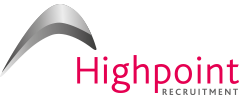
Furloughed Staff
A recent REC live poll showed that 60% of our industry have furloughed all or some of their employees, and this reflects conversations Highpoint have been having with our clients.
Maintaining the moral and engagement of furloughed employees will be key to the success of businesses once lock-down starts to be lifted. Our clients are maintaining contact with their staff via daily video calls via teams and other platforms, and weekly quiz’s etc.
These are positive steps to engage with your employees, however, is it intellectually stimulating, does it have a purpose and value for the individual?
Whilst furloughed staff cannot actively participate in the business, there is a risk of disconnect. However, they can complete job related training CIPD (2020).
You can use this as an opportunity to upskill your staff and keep them engaged with the business.
Training and Development
Employers can take this opportunity to support furloughed employees, not just financially but also from a personal development perspective. Line managers can encourage individuals to identify skills they would like to develop or learn, and put a plan of action in place for the furlough period.
Many employers and employees have regular discussions in 1-2-1’s regarding personal development and training. However, because of commercial pressures employees can struggle to pull themselves away from work, resulting in learning and development needs and aspirations not always being actioned.
Use this time to your advantage, look at how you can train and support your staff, what resources are available or required, how progress will be monitored and how outcomes will can be measured.
Training and personal development can take a variety of different forms, it does not necessarily mean taking a qualification or attending classroom based training courses.
Highpoint has a range of on-line training tools from MS Office training to sales, customer service and sales and management training, which is being made available to our clients and their employees.
Also included in the suit is a range of testing tools including psychometric testing, verbal and numerical reasoning, etc.
Email: Rebekah@highpointrec.co.uk for information.
Learning and development can be a meaningful way for line managers to engage with furloughed individuals, providing additional purpose to catch up calls and an opportunity for feedback. It can also encourage departmental collaboration, communication and involvement.
Social Media Training:
Marketing departments could put together basic training and information tools regarding social media, such as planning, writing short form content and blogging with links to on-line content.
This would provide a pool of skilled contributors when business resumes and goes a long way to solving a regular gripe from comms professionals that they don’t get enough relevant and timely contribution from their colleagues.
Mentoring:
This is an opportunity to identify individuals with skills and expertise who are generally too busy to share this in a structured or organised manner.
There are a plethora of Ted Talks and YouTube videos on the subject which can help them understand the value of their knowledge and provide tips and hints on how to share with colleagues.
Conversely HR or Line Managers could identify mentees who would benefit from mentoring and start a discussion with them. Sow the seeds by putting a plan together with links to articles and tutorials around how working with a mentor would be valuable to them.
For example, some line managers responsible for budgeting and forecasting find this is not their strength. Aligning them with a mentor from the finance team to explain and identify what they find a challenge could help them turn a weakness into a strength, which will strengthen their performance on their return.
Maintaining employee engagement using positive interventions during these unprecedented times will strengthen businesses when the lock down is lifted. Retaining and developing valuable talent is essential for the future performance and success of the businesses.
For more information on mental health and working from home check out some of our latest blogs in what’s the latest?



